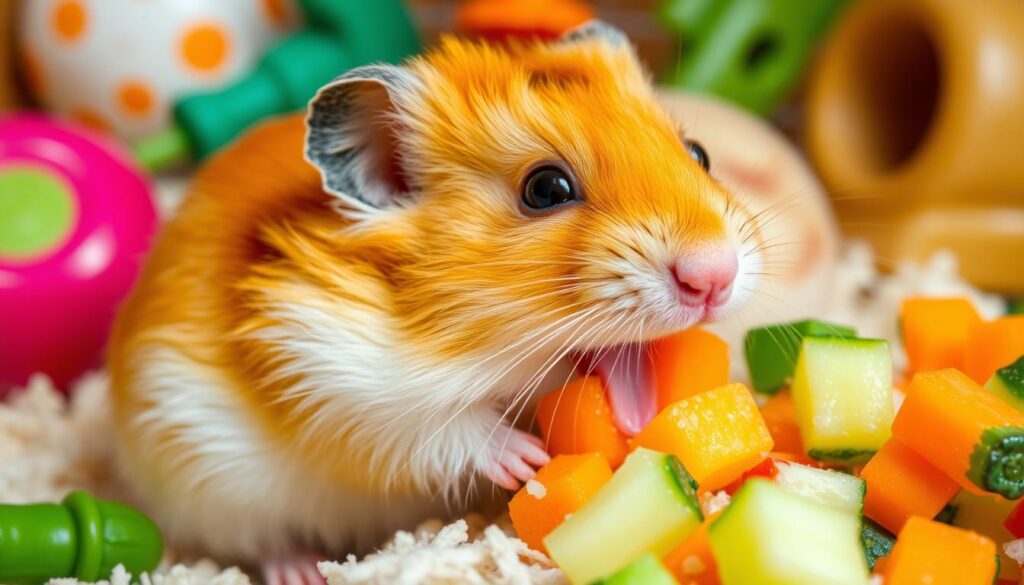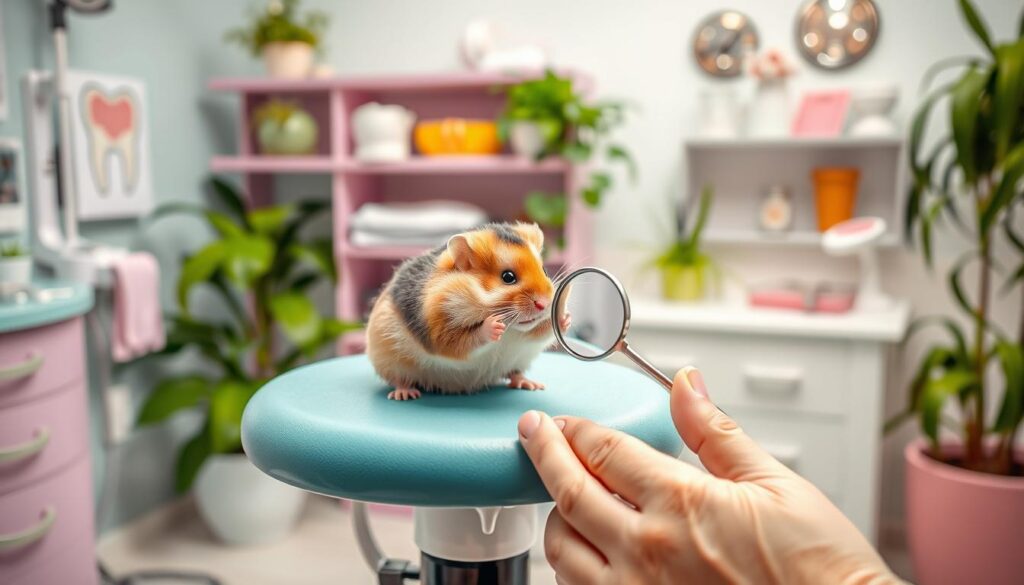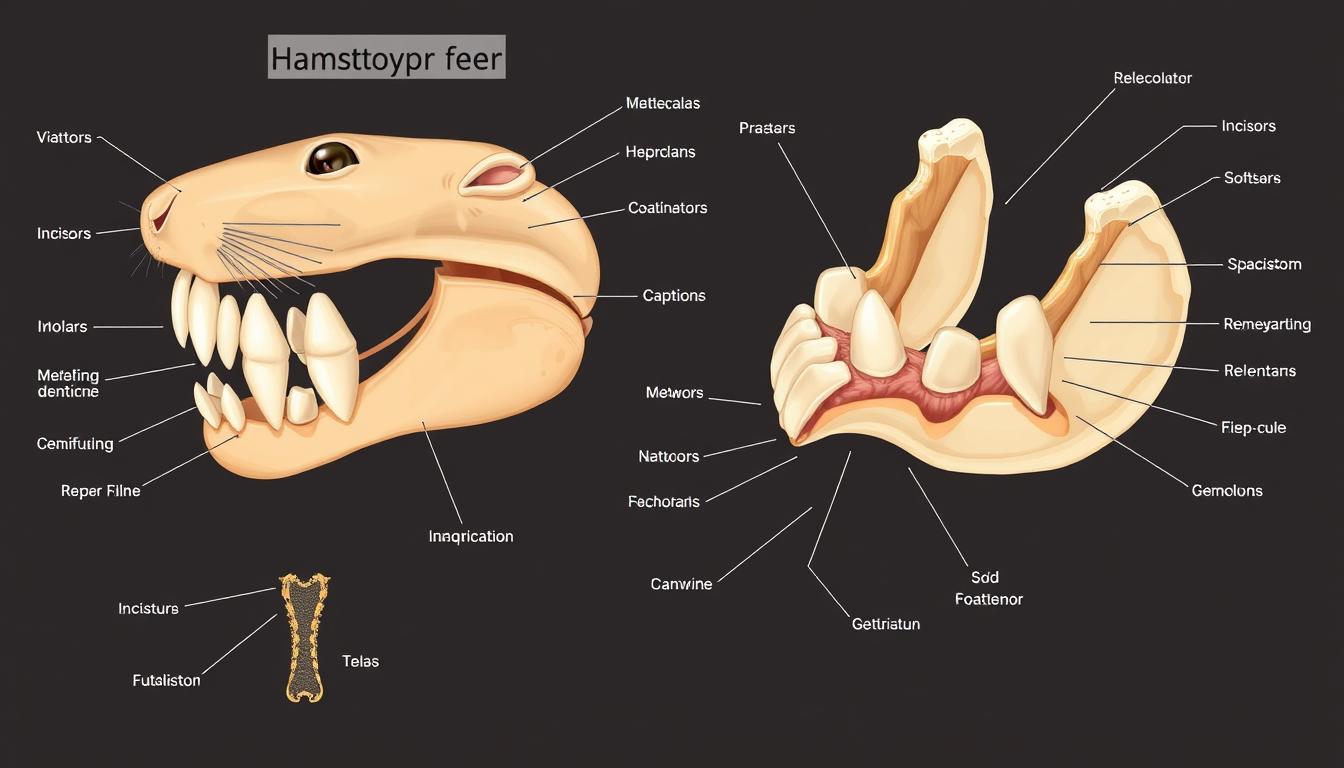Do you know that your hamster’s teeth health is key to their happiness? Many pet owners forget about dental care, but it’s crucial. This guide will show you how to keep your hamster’s teeth in top shape.
Key Takeaways
- Understand the importance of hamster dental health for their overall well-being
- Learn about the different types of teeth in hamsters and their unique dental anatomy
- Discover common dental problems in hamsters and how to prevent them
- Explore the role of chew toys and a balanced diet in promoting healthy teeth
- Recognize the signs of dental issues and when to seek veterinary assistance
Understanding Hamster Teeth Anatomy
As a hamster owner, it’s key to know about your pet’s teeth. Hamsters have special teeth for their natural behaviors and diet.
Types of Teeth in Hamsters
Hamsters have 16 teeth, with four sharp incisors and 12 molars. The incisors are at the front and help gnaw through tough stuff like hay and wood. The molars grind food for easier digestion.
Hamster teeth grow all the time. They need to be chewed down to stay healthy. This keeps their teeth from getting too long.
Importance of Dental Health
Good rodent dental health is vital for a hamster’s well-being. Dental problems can cause eating issues, pain, and even infections. Regular dental checks and a balanced diet can prevent these issues.
“Proper dental care is crucial for a hamster’s overall health and longevity.”
Common Dental Problems in Hamsters
Hamsters are loved pets that need special care for their teeth. They often face issues like overgrown incisors and broken or chipped teeth. It’s important to know the signs of dental trouble to keep them healthy.
Overgrown Teeth
Hamster incisors grow all their lives. Without chewing, they can grow too long. This can make eating hard, cause pain, and lead to serious health problems if not fixed.
Broken or Chipped Teeth
Hamsters can also get teeth broken or chipped. This usually happens when they chew on hard things or the wrong items. These hamster dental problems make eating hard and can hurt.
Signs of Dental Discomfort
- Reluctance to eat or avoid certain foods
- Excessive drooling or pawing at the face
- Changes in behavior, such as lethargy or aggression
- Visible signs of injury or infection in the mouth
Spotting these signs early can help fix hamster dental problems. This keeps your pet happy and healthy.
How Do You Care for a Hamster’s Teeth?
Keeping your hamster’s teeth healthy is key to their happiness. Hamsters’ teeth grow all their lives. They must chew often to keep their teeth from getting too long. To take care of your hamster’s teeth, give them the right chew toys and a good diet.
Providing Chew Toys
Choosing the right chew toys is vital for hamster dental care. Hamsters love to chew, and the right toys help wear down their teeth. Offer wooden toys, hay-based items, and cardboard tubes for them to chew on.
Offering a Balanced Diet
A balanced diet is also crucial for hamster dental health. A diet full of fresh veggies, grains, and healthy treats helps keep teeth strong. Stay away from sugary or high-fat foods, as they can harm their teeth and health.
| Food Category | Recommended Items |
|---|---|
| Fresh Vegetables | Carrots, bell peppers, broccoli, spinach |
| Grains | Whole wheat bread, oats, hay |
| Treats | Unsweetened dried fruit, plain popcorn, almonds |
By giving your hamster the right chew toys and a balanced diet, you can keep their teeth healthy. This helps avoid common dental problems.
Foods That Promote Healthy Teeth
Keeping your hamster’s teeth healthy is key for their well-being. There are many foods that can help. From fresh veggies to chewable treats, let’s look at the best options for your furry friend’s dental care.
Safe Fresh Vegetables
Adding fresh veggies to your hamster’s diet is great for their teeth. Carrots, cucumbers, and bell peppers are good choices. They’re crunchy and full of nutrients that help wear down their teeth.
Start with small amounts of new veggies to avoid upset stomachs. This helps your pet adjust slowly.
Grains and Chewable Treats
Grains and chewable treats are also good for your hamster’s teeth. Whole grains like timothy hay or brown rice are crunchy and healthy. Chewable treats, like wooden blocks or dried fruit, also help keep their teeth in shape.
By giving your hamster a variety of tooth-friendly foods, you can keep their teeth strong. Regular dental check-ups and good dental care are also important for their smile.

The Role of Chew Toys in Dental Care
Keeping your hamster’s teeth healthy is key. The right chew toys can help a lot. Hamsters’ teeth grow all the time. Without chewing, these teeth can get too long and cause big problems. We’ll look at the best chew toys for hamsters and some easy DIY ideas to keep their teeth in top shape.
Types of Chew Toys for Hamsters
Hamsters enjoy chewing, and the right toys can keep their teeth healthy. Here are some great options:
- Wooden toys: Natural, untreated wood is perfect for hamsters. It helps wear down their teeth.
- Cardboard: Cardboard tubes and boxes are fun and safe for your hamster to chew on.
- Hay-based toys: Compressed hay or timothy hay cubes are tasty and good for chewing.
- Mineral stones: Special mineral stones for hamsters help wear down teeth and add nutrients.
DIY Chew Toy Ideas
Want to get creative? Making your own hamster chew toys is easy. Here are a few ideas:
- Toilet paper or paper towel rolls: Cut them into bits and fill with hay or safe materials.
- Untreated, unpainted wooden blocks: Cut or buy small wooden blocks for your hamster to chew.
- Homemade hay cubes: Make small hay cubes for your hamster to nibble on.
Always choose safe, non-toxic materials for chew toys. A variety of toys keeps your hamster’s teeth healthy and keeps them happy and stimulated.
Regular Dental Check-ups
Keeping your hamster’s teeth and gums healthy is key to their happiness. Regular vet visits are essential for this. They help keep your hamster’s dental health in check.
How Often to Visit the Vet
Experts say you should take your hamster to the vet at least once a year. At this visit, the vet will check your hamster’s teeth and gums. They look for any dental problems early on.
What to Expect During a Dental Check-up
A hamster dental check-up includes several steps:
- The vet will look at your hamster’s teeth and gums for any issues.
- They will clean your hamster’s teeth to prevent dental problems.
- You’ll talk about your hamster’s diet and any signs of dental trouble.
- The vet will suggest ways to care for your hamster’s teeth at home.
By following your vet’s advice and getting regular dental check-ups, you can keep your hamster’s teeth and gums healthy. This prevents expensive and painful dental problems later on.

Recognizing Signs of Dental Problems
Watching your hamster closely can help spot dental issues early. Knowing the signs of dental problems in hamsters lets you act fast. This keeps your pet healthy and happy.
Behavioral Changes to Watch For
Watch how your hamster eats. If they struggle with food, drop pieces, or skip hard foods, they might be in pain. Also, notice if they groom less. This could mean they’re having dental trouble.
Physical Symptoms of Tooth Issues
Check your hamster’s teeth and gums often. Look for long, broken, or yellow teeth, and swollen or red gums. Any discharge or bad smell could mean an infection.
If you see these signs of dental issues in hamsters, act quickly. Early action can stop problems from getting worse and keep your hamster healthy.
“Recognizing the early warning signs of dental problems in hamsters is crucial for their health and comfort. Paying close attention to your pet’s behavior and physical appearance can help you identify issues before they become more serious.”
Stay alert and take care of your hamster’s teeth to ensure their happiness and health. Early treatment of hamster teeth problems prevents bigger issues later.
Managing Dental Hygiene at Home
Keeping your hamster’s teeth clean is easy. A few simple steps can help. Let’s look at how to manage hamster dental hygiene and cleaning hamster teeth at home.
Daily Observation Techniques
Watching your hamster’s teeth daily is important. Spend a few minutes each day checking their teeth and gums. Look for any signs of problems like overgrowth or discoloration.
By being careful, you can catch dental issues early. This keeps your hamster’s mouth healthy.
Cleaning Your Hamster’s Teeth
- Feed your hamster foods high in fiber. This helps wear down their teeth. Good choices include crunchy veggies, hay, and hamster pellets.
- Give them chew toys to help file their teeth naturally. Options include wooden blocks, cardboard tubes, and safe branches.
- If your hamster needs it, talk to your vet about tooth-brushing. Use a soft toothbrush and pet-safe toothpaste.
By following these hamster dental hygiene tips, you can keep your hamster’s teeth healthy. This will help them stay strong for a long time.
“Maintaining your hamster’s dental health is crucial for their overall well-being. With a little care and attention, you can keep their teeth in prime condition.”
When to Seek Veterinary Assistance
Keeping your hamster’s teeth healthy is key. But, sometimes, even with good care, problems can pop up. Knowing when to go to the vet is crucial for your hamster’s health.
Red Flags for Dental Issues
- Difficulty eating or chewing
- Drooling or excessive saliva production
- Swelling or discoloration around the mouth
- Behavioral changes, such as lethargy or aggression
- Unusual odor from the mouth
If you see any of these signs, get a vet appointment fast. Hamster dental emergencies need quick action to keep your pet safe and comfortable.
Preparing for a Vet Visit
When you take your hamster to the vet, be ready to share lots of info. Note when you first saw the problem, any changes in your hamster’s behavior or eating, and any home treatments you’ve tried. This helps the vet figure out what’s wrong and how to fix it.
Also, know your hamster’s medical history and any current treatments or meds. Bringing your hamster’s cage or a sample of its bedding can help the vet understand your pet’s environment and care better.
By being alert and acting fast when when to see a vet for hamster teeth issues come up, you can help your hamster stay healthy and happy.
Tips for First-Time Hamster Owners
Getting a new hamster is thrilling, but being ready is key for their dental health. As a first-timer, knowing the must-haves and setting up a good routine is essential. This ensures your pet gets the best care.
Essential Supplies for Dental Care
You’ll need a few important things for your hamster’s teeth. Get durable chew toys like wooden blocks or natural branches. These help wear down their teeth. Also, have a small, safe toothbrush and pet-friendly toothpaste for occasional brushing.
Building a Healthy Routine
Creating a regular dental care routine is crucial. Spend a few minutes each day watching your hamster’s teeth and behavior. Look for any signs of dental issues. Offer a varied diet with crunchy foods, fresh veggies, and treats to keep their teeth and gums healthy. Being proactive and attentive from the start is vital for your hamster’s dental health.




